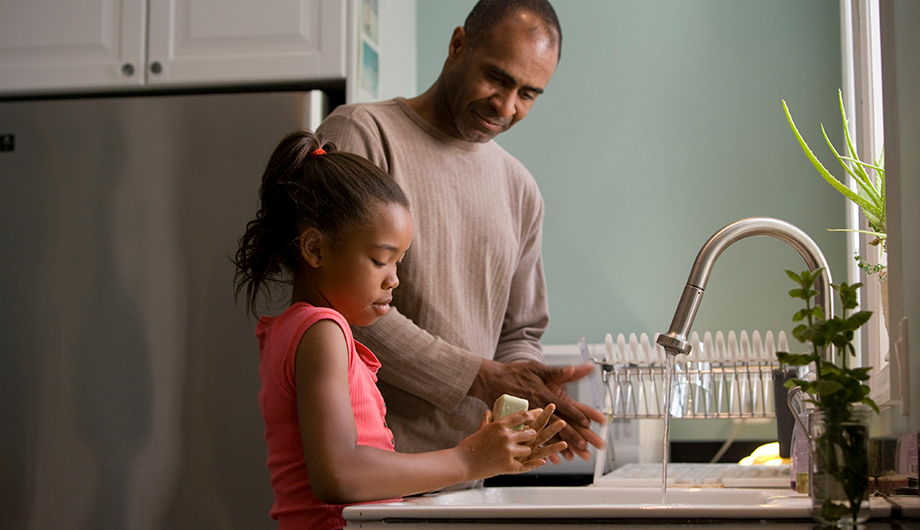New Normal for Good Outcomes
The Challenging Behaviour National Strategy Group meeting, ‘Post Covid-19: a new normal to deliver good outcomes’, was held virtually on the 8th October 2020. The event was focused on the changes for individuals with learning disabilities and their families brought about by the pandemic and the resulting restrictions. During the meeting, attendees reflected on the NHSE Trauma Collaborative; the ‘new normal’ research by CB-NSG members and family carer experiences to identify what should and should not be taken forward to ensure that any positive changes are retained in the ‘new normal’. This was the first virtual CB-NSG meeting to have taken place and it was structured slightly differently to usual. While presentations were given, attendees were able to comment, ask questions and share resources via the virtual chat. After each presentation, attendees broke-off into smaller groups to discuss key questions and agree actions to take forward.
Discussions and actions were focused around the Challenging Behaviour Charter point eight:
Charter Point 8: Children, young people and adults have the right not to be hurt or damaged or humiliated in any way by interventions. Support and services must strive to achieve this.
Outcomes
The planned outcomes for the meeting were as follows:
- To have listened to families of people with learning disabilities and behaviour described as challenging about their experiences and the causes and impact of trauma, including trauma caused by overmedication.
- To have identified how Covid-19 and the national lockdown has impacted individuals with learning disabilities, their families and support organisations, based on the findings of the ‘New Normal’ interviews and surveys.
- To have considered best practice examples, and
- how these can be embedded into a ‘new normal’ to ensure good outcomes;
- how to prevent trauma for individuals with learning disabilities and their families;
- identified which practices need to be modified.
- To have considered the impact of poor practice and specific learning during Coivd-19 to agree individual, organisational and collective actions to ensure the delivery of good outcomes for children, young people and adults with learning disabilities and their families.
Presentations and Discussions
Family Carer presentation: ‘Free as a bird’: learning to live after trauma
The meeting was opened by a family carer who shared the experiences of her son, who had spent five and a half traumatic years as an inpatient after the system failed to provide him with the support he needed in the community and during transition from child to adult services. The family fought for years for their son’s discharge and he now lives happily in a bespoke personalised supported living arrangement, through a personal Health Budget his mum manages. The trauma of the whole family’s difficult experience with the services that were meant to be supporting them is significant and ongoing.
The powerful messages and bravery of the family carer in sharing their story had an impact on the members of the meeting and inspired a day of focused discussion on how to ensure the ‘new normal’ emerging from pandemic delivers good outcomes for people with learning disabilities and their families.
Real life stories never stop moving me and will continue to drive all that we do.
A very moving and an important theme to include in the training and continuing professional development of all professionals involved in care. I feel a deep sense of sadness and humility as a professional that XXXX’s story is one that involved such unnecessary and additional trauma.
My blood is boiling. We have to do better and it is important, though difficult, to hear about what happened to XXXX and your family. And you’ve also shown what works – kindness and the right support at the right time.
The CBF: ‘Broken: The psychological trauma suffered by family carers of children and adults with autism and/or learning disabilities & the support required
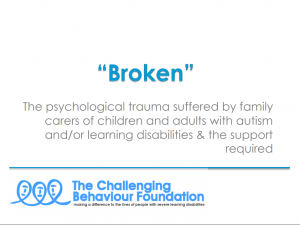
Viv Cooper presented the results from the CBF’s trauma survey, one strand of a wider Respond, Tizard and CBF project commissioned by NHSE to investigate the availability and effectiveness of trauma support for family carers of children and adults with learning disabilities and/or autism. The findings from the survey provided evidence that the current system is dramatically failing families and that too often their interaction with ‘the system’ and services adds to, or is the cause of, trauma and its devastating impact.
In the following Q&A, the group discussed the importance of trauma-informed support and the need for trauma-awareness to be embedded in training for professionals and service providers to prevent avoidable trauma.
The trauma presentation can be found here
You can read the full report of the findings of the trauma survey here
STOMP/STAMP
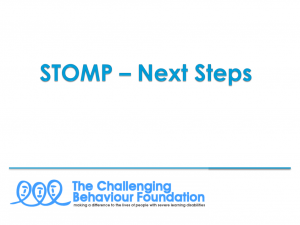
Another family carer gave the first thematic presentation of the day, sharing their expertise on the STOMP/STAMP project, a NHSE initiative launched in December 2018 that aimed to tackle the overmedication of people with learning disabilities and/or autism. They explained what has been done so far and outlined the next steps for the project.
During the presentation, comments in the chat emphasised the importance of a genuinely person-centric approach to combat over-medication and connected STOMP/STAMP with alleviating one of the most common causes of trauma for families. Two resources were shared regarding NHS and NICE guidelines:
NHS guidance for medication review and medicines optimisation
The attendees then went into break-out rooms to discuss the following key concepts:
- What are the barriers?
- Whose responsibility?
- What needs to be done?
- How will it be done?
The outcomes from these discussions were then fed back to the main group.
The actions from this workshop are available here
The STOMP presentation is here
CQC/PBS Academy
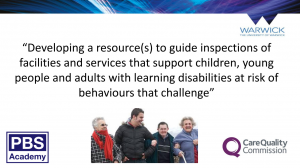
Louise Denne, accompanied by colleagues Leanne Bacon and Guy Cross from CQC, gave a presentation on ‘Developing a resource(s) to guide inspections of facilities and services that support children, young people and adults with learning disabilities at risk of behaviours that challenge’ an action that was agreed at a previous CB-NSG meeting. An update was given on the work so far and Louise explained the project’s proposed logic model and vision. Attendees then split into break-out rooms, tasked with answering the following questions from Louise:
- Is this inspection process more likely to highlight areas of concern within and across services?
- Will service providers have a greater incentive for implementing the PBS Academy standards of service delivery?
- Is there anything that we are missing?
A summary of the discussion themes can be found here
A copy of the presentation can be found here
Doing Group update
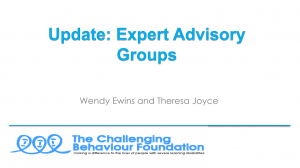
The idea of Regional Expert Groups was first suggested at the CB-NSG meeting in November 2019 and the CB-NSG steering group presented a proposal to NHSE in February 2020. These discussions have evolved into a ‘Doing Group’ – a group of people with specialist knowledge and experience who have worked together to agree “what we need to do” to get people out of inappropriate inpatient services. Two members of the group, Wendy Ewins and Theresa Joyce, presented an update on the work so far and outlined the next steps, which include a pilot test of the model in one area and finalising any NHSE support.
The Expert Advisory Group presentation can be found here
New Normal
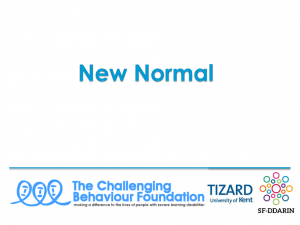
The afternoon sessions focused on the ‘New Normal’, evaluating what has been a challenge for individuals with learning disabilities and their families during the pandemic, what has worked, and how we can ensure that the ‘New Normal’ does not involve returning to what was not producing good outcomes for many people with learning disabilities.
This session opened with presentations which explored the findings of two research projects: a series of interviews and a survey. Nik Manktelow of SF-DDARIN outlined the preliminary findings collected from the first set of a series of interviews with family carers, which are being conducted by the CBF, SF-DDARIN, and the Tizard Centre. CBF intern Liam Doherty then presented the findings of the CBF’s ‘New Normal’ survey, which investigated good practice examples from families, individuals, and organisations in the learning disability field.
Following the presentations, a workshop and feedback session was led by Jill Bradshaw of the Tizard Centre. Attendees divided into breakout rooms to discuss, firstly, whether the findings reflected their own personal or professional experience, and secondly which actions can be agreed in order to build upon the lessons learnt from the pandemic and ensure better outcomes for individuals with learning disabilities in a ‘New Normal’. Groups each discussed one of five sub-topics – Mental Health, Communications, Children’s services, Adult services, and Relationships. The results of these discussions will be developed into a report of the New Normal work and fed into strategic work.
The outcomes from these discussions were then fed back to the main group.
The actions from this workshop are available here
The presentation can be found here
Feedback
Overall the day was received positively by attendees and was rated overwhelmingly as ‘useful’ or ‘very useful’ by attendees.
To read a full summary of the evaluation please see here
Many thanks to all who presented or led workshop discussions.

